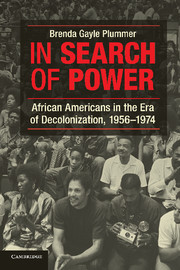Book contents
- Frontmatter
- Contents
- Figures
- Introduction
- 1 A Great Restlessness
- 2 Peace or a Sword?
- 3 “Freedom’s Struggle Crosses Oceans and Mountains”
- 4 Meeting Odinga
- 5 When Race Doesn’t Matter
- 6 Embracing the Globe
- 7 Race, Space, and Displacement
- 8 Africa and Liberation
- 9 Agenda Setting on Two Continents
- Conclusion
- Bibliography
- Index
- References
6 - Embracing the Globe
Published online by Cambridge University Press: 05 December 2012
- Frontmatter
- Contents
- Figures
- Introduction
- 1 A Great Restlessness
- 2 Peace or a Sword?
- 3 “Freedom’s Struggle Crosses Oceans and Mountains”
- 4 Meeting Odinga
- 5 When Race Doesn’t Matter
- 6 Embracing the Globe
- 7 Race, Space, and Displacement
- 8 Africa and Liberation
- 9 Agenda Setting on Two Continents
- Conclusion
- Bibliography
- Index
- References
Summary
Just as the Congo crisis cast a pall over earlier optimism about independent Africa, the Nigerian civil war heightened the pessimism in official circles. Only five years after the exhilaration of 1960, the CIA’s National Intelligence Estimate took a dim view of the African states. Lagging growth “in most areas will be very slow; indeed, setbacks are probable in a number of countries,” the report noted. “There is a desperate shortage of virtually all kinds of technical and managerial skills; indeed, the basic institutions and staff for economic development are often inadequate or absent. Moreover, it is highly unlikely that most African countries will obtain external assistance or investment on anything approaching the scale required for sustained economic development.” Loy Henderson, retired but still prominent, regarded many African nations as “mini-states,” “so insignificant” that they hardly merited a consulate. It was cheaper, however, to name ambassadors to them and spare the cost to the departmental budget that appointing a regional ambassador, traveling frequently and required to entertain lavishly, would entail.
Fourteen months later, a State Department task force charged with reviewing Africa policy remained dismissive. It declared that Washington’s “primary concern with Africa has been, and will continue to be for some time, to prevent events in the continent from complicating a search, largely conducted elsewhere, for solutions to the problems of war and peace, or from interfering with our central strategic and political preoccupations in other regions.” The ethnic tensions then overtaking Nigeria would be of no great concern unless they had the potential to affect matters in areas of greater interest to policy makers.
- Type
- Chapter
- Information
- In Search of PowerAfrican Americans in the Era of Decolonization, 1956–1974, pp. 200 - 234Publisher: Cambridge University PressPrint publication year: 2012

